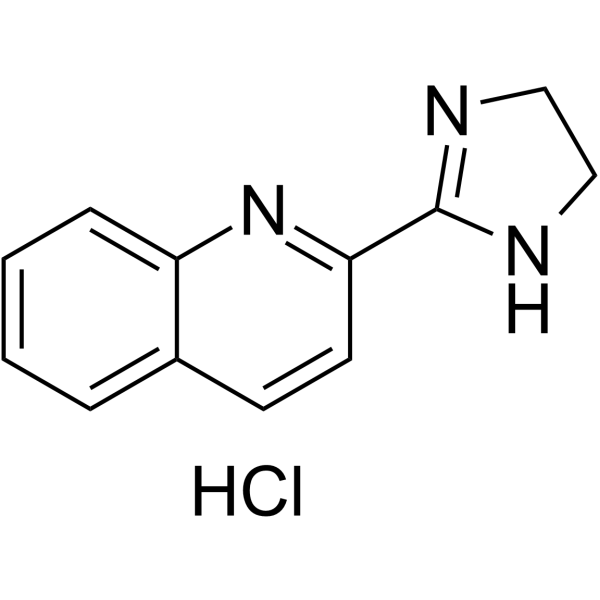
BU 224 hydrochloride
CAS No. 205437-64-5
BU 224 hydrochloride ( —— )
产品货号. M27501 CAS No. 205437-64-5
BU 224 盐酸盐是一种选择性咪唑啉 I(2) 结合位点配体,具有镇痛和抗抑郁样活性。
纯度: >98% (HPLC)
 COA
COA
 Datasheet
Datasheet
 HNMR
HNMR
 HPLC
HPLC
 MSDS
MSDS
 Handing Instructions
Handing Instructions
| 规格 | 价格/人民币 | 库存 | 数量 |
| 2MG | ¥389 | 有现货 |


|
| 5MG | ¥648 | 有现货 |


|
| 10MG | ¥988 | 有现货 |


|
| 25MG | ¥2130 | 有现货 |


|
| 50MG | ¥3418 | 有现货 |


|
| 100MG | ¥4949 | 有现货 |


|
| 500MG | ¥10449 | 有现货 |


|
| 1G | 获取报价 | 有现货 |


|
生物学信息
-
产品名称BU 224 hydrochloride
-
注意事项本公司产品仅用于科研实验,不得用于人体或动物的临床与诊断
-
产品简述BU 224 盐酸盐是一种选择性咪唑啉 I(2) 结合位点配体,具有镇痛和抗抑郁样活性。
-
产品描述BU 224 hydrochloride is a selective imidazoline I(2) binding site ligand and has antinociceptive and antidepressant-like activities.(In Vivo):BU 224 hydrochloride (5 mg/kg; i.p.) attenuated spatial and perirhinal cortex-dependent recognition memory deficits in 5XFAD mice. Fear-conditioning testing revealed that BU 224 hydrochloride also improved both associative learning and hippocampal- and amygdala-dependent memory in transgenic but not in WT mice. In the brain, BU 224 hydrochloride reduced levels of the microglial marker Iba1 and pro-inflammatory cytokines IL-1β and TNF-α and increased the expression of astrocytic marker GFAP in 5XFAD mice.
-
体外实验——
-
体内实验BU224 hydrochloride (5 mg/kg, IP, twice a day for 10 days) improves behavioural performance and memory function in 5XFAD mice.BU224 hydrochloride (5 mg/kg, IP, twice a day for 10 days) reduces levels of the microglial marker Iba1 and pro-inflammatory cytokines IL-1β and TNF-α and increased the expression of astrocytic marker GFAP in 5XFAD mice.BU224 hydrochloride (10 mg/kg, IP, once) reduces immobility of rats in the FST (forced swim test), indicative of antidepressant-like activity. Animal Model:5XFAD mice and and WT littermates (6-month-old) Dosage:0 mg/kg, 5 mg/kgAdministration:IP, twice a day for 10 daysResult:Significantly increased immobility (54% increased freezing), and reversed memory deficits secondary to the deposition of Aβ in the brain.
-
同义词——
-
通路Others
-
靶点Other Targets
-
受体——
-
研究领域——
-
适应症——
化学信息
-
CAS Number205437-64-5
-
分子量233.69
-
分子式C12H12ClN3
-
纯度>98% (HPLC)
-
溶解度In Vitro:?DMSO : 12.5 mg/mL (53.49 mM)
-
SMILESC1CN=C(N1)C2=NC3=CC=CC=C3C=C2.Cl
-
化学全称——
运输与储存
-
储存条件(-20℃)
-
运输条件With Ice Pack
-
稳定性≥ 2 years
参考文献
1.Mahanta S, et al. Sour beer production in India using a coculture of Saccharomyces pastorianus and Lactobacillus plantarum: optimization, microbiological, and biochemical profiling. Braz J Microbiol. 2022 Jun;53(2):947-958.
产品手册




关联产品
-
Anisole
苯甲醚是一种天然调味剂,是香水、昆虫信息素和药物的前体。
-
C-Type Natriuretic P...
C-Type Natriuretic Peptide, Chicken
-
Diphyllin O-glucosid...
Cleistanthin B (Diphyllin O-glucoside) 是一种具有口服活性的芳基萘木酚素内酯糖苷。Cleistanthin B 在 Vero 细胞中表现出抗 SARS-CoV-2 作用,EC50 值为 6.51 μM。Cleistanthin B 在体内具有抗肿瘤、利尿和抗高血压的作用。



 021-51111890
021-51111890 购物车()
购物车()
 sales@molnova.cn
sales@molnova.cn







